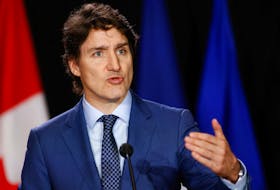The federal Liberals appear to be on track when it comes to tackling social issues, adding initiatives here and there and mulling over more policies, as seen at its recent convention in Halifax. But nowhere to be seen is any plan about how to fund new programs other than by slipping this country further and further into debt.
This week, the parliamentary budget officer warned that the financial picture is even bleaker than the government forecasts.
Among resolutions from the convention, as proposed by the Liberals national caucus, is a call for expansion of the universal health-care system to include coverage of prescription drugs. The party does have in place an advisory committee to study that very issue of national pharmacare. As many would argue, that should be a key element of health care, since some people in Canada simply can’t afford prescriptions and have no other coverage – meaning in some cases going without vital medication.
As beneficial as that might be, and also considering the national bulk purchase of drugs would result in savings, there would still be a cost presumably borne by taxpayers – possibly a reason why the government hasn’t immediately jumped on the idea.
In other areas of trying to ensure the well-being of Canadians, the federal government implemented a plan in its most recent budget to expand benefits for the working poor through the Canada Workers Benefit.
Again, a worthy initiative, but according to the parliamentary budget officer, it will be more costly than the finance department has anticipated. Jean-Denis Frechette’s team has identified a number of other areas and contends that the government has lowballed the figures.
For the 2018-19 fiscal year, the PBO says the shortfall will be $22.1 billion, $4 billion more than the feds had forecast in the budget, released in February. The pattern continues in in 2019-20, according to the PBO, a $21.4 billion deficit, $3.9 billion higher than what the government is forecasting.
The federal government recently passed a disturbing milestone in this regard, with the overall debt having accumulated to a trillion dollars. And, as many observers continue to note, the Liberals have yet to indicate when they will manage to bring the books back into black. The budget office predicted odds of five per cent that the budget would be balanced by 2020-21.
When the Trudeau Liberals smoothly sailed to a win in 2015, they pledged to run moderate deficits for a couple of years, money they said would breathe life into the economy. The “D” word apparently didn’t raise alarm bells among voters, since they went along with the pitch. And in the 2 ½ years following that election, deficit financing has again become par for the course – as it was for much of the past five decades. That’s how you rack up a trillion in debt.
It will be interesting to see how long it takes for the public mood to become more concerned about this looming financial straitjacket. It’s something that doesn’t, on the surface, affect them every day.
We could argue that the social programs being budgeted will benefit coming generations, young people perhaps not even at voting age, the same as it benefits current generations. But we’re leaving behind an awful tab for our children, grandchildren and so on.








